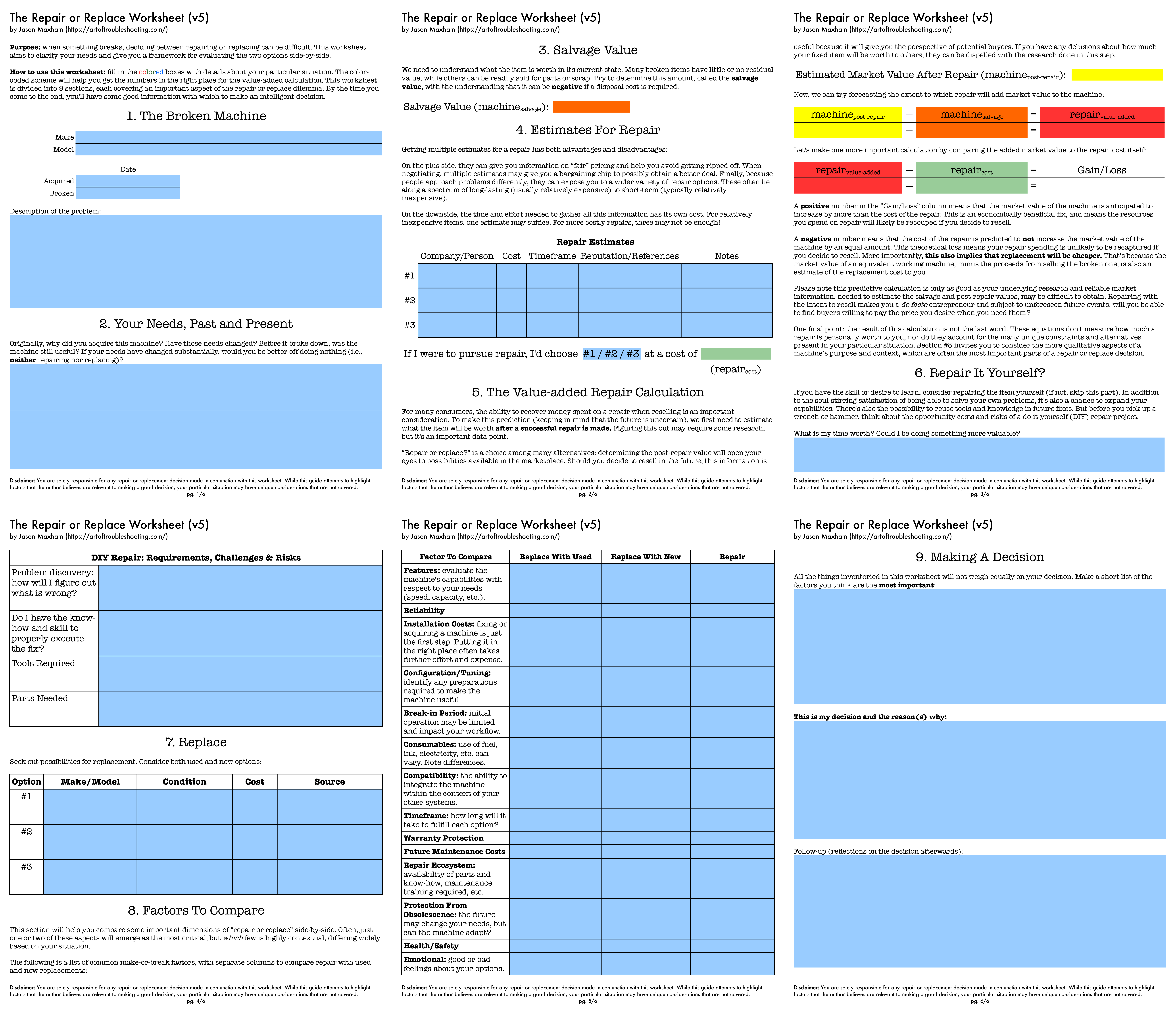I’ve written a lot about the “repair or replace” dilemma, both the theory and the many practical challenges that can make this a difficult choice. The most popular article on this site is about the 50% Rule, so this topic is clearly on the minds of my readers. Hopefully the discussion has been useful, but I wanted to go one step further and create a guide to help someone through an actual “repair or replace” decision. Here is the result:
The Repair Or Replace Worksheet – v5.pdf
Divided into 9 sections, the guide systematically takes you through what I believe are the most important components to making a good decision (see disclaimer*). The worksheet begins by asking you to provide information about the machine that is broken and the repair that is being considered. Then, it shows you how to make the value-added calculation to see if you’re contemplating an uneconomic repair. Lastly, it asks you to inventory and compare some key factors side-by-side before making your decision.
I look forward to your feedback!
*Disclaimer: You are solely responsible for any repair or replacement decision made in conjunction with this worksheet. While this guide attempts to highlight factors that the author believes are relevant to making a good decision, your particular situation may have unique considerations that are not covered.

A wonderful guide! I have read the PDF and you have made it quiet descriptive. The concept of cash estimate of repair car section really give me some new idea. Thanks for sharing a informative post.
Keep up the great work!
LikeLike
Just read about the Hubble Telescope which NASA (allegedly) plans to allow back to earth to disintegrate over an ocean somewhere in a few years’ time. What a waste. I wish we could use your worksheet and crowd-sourcing to keep it going a lot longer under private (I mean crowd-sourced) management. A beautiful machine like that deserves much better. Bruce
LikeLike
Dear Jason,
As always a useful Blog.
I intend to follow your worksheet through for my neighbor’s RAV4 automatic which has an annoying fault – sometimes it will change up to 4th and sometimes it won’t. The agent and several other mechanics have tried for over 2 years and I will now try to use your worksheet to assess how much time I can justify, before my time becomes worth more than the repair.
I will also use it to assess a repair on my 1963 Cat 112 motorized grader. My favorite toy (that I bought for $100 with 1 1/2 wheels and an incomplete engine). It runs on a Ford (New Holland) tractor engine and needs some work done on the blade controls – work which I plan to give to an outside mechanic. (So far as I remember your Art of Trouble-shooting doesn’t mention Ricard’s law which states that, even if the outside repair is more costly than if had I done it myself, the fact that it allows me to focus on planting my barley crop, means that I will earn so much more from the barley that I can easily justify the higher cost of an outside mechanic.)
I will certainly report back on whether your worksheet leads me to apparently correct decisions.
Best4now,
Bruce
LikeLike
I think you mean David Ricardo’s theory of comparative advantage in international trade. The worksheet does address a similar concept where it asks about the opportunity costs of doing a repair yourself. If you earn $1000/hour at your job and hiring a mechanic costs $100/hour, it makes sense to concentrate your efforts on the higher paid work when there’s a tradeoff.
LikeLike